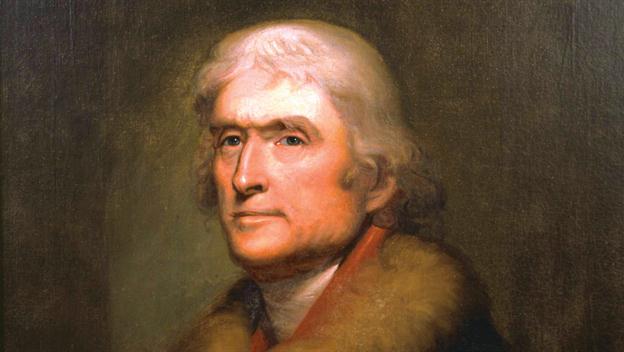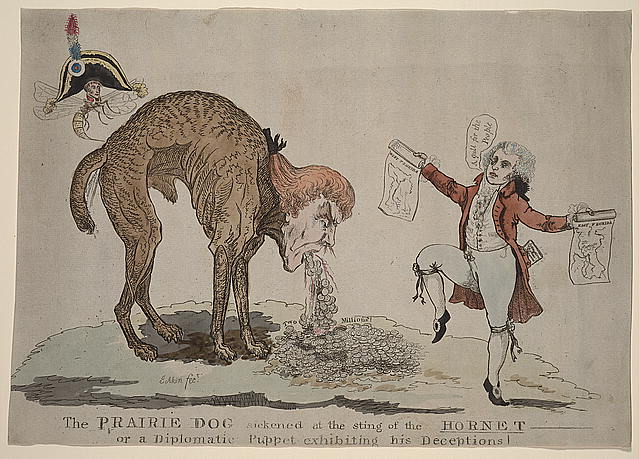American History
Related: About this forumOn this date, April 13, 1743, Thomas Jefferson was born.
Wed Apr 13, 2022: On this date, April 13, 1743, Thomas Jefferson was born.
Tue Apr 13, 2021: On this date, April 13, 1743, Thomas Jefferson was born.
Mon Apr 13, 2020: Born on this day, April 13, 1743: Thomas Jefferson
Sat Apr 13, 2019: Happy birthday, Thomas Jefferson.
This is a rerun from 2018: Happy birthday, Thomas Jefferson.
and 2017: Happy birthday, Thomas Jefferson.
and 2016: Happy birthday, Thomas Jefferson.
I'll link to 2019 Muzzies when they're announced.
Full disclosure: I have some $2 bills in my wallet.

Born, on April 13, 1743, in Shadwell, Virginia, to the Jefferson family, a baby boy. They gave him the name Thomas. (April 13 is the date of birth using a Gregorian calendar. On a Julian calendar, in use at the time, his date of birth was April 2.)
He went to school at William & Mary and read for the law. You can still do that in Virginia and Tennessee. {Uh oh, that seems to have changed. See below.}
United States
In colonial America, as in Britain in that day, law schools did not exist at all until Litchfield Law School was founded in 1773. Within a few years following the American Revolution, some universities such as the College of William and Mary and the University of Pennsylvania established a "Chair in Law". However, the holder of this position would be the sole purveyor of legal education for the institution, and would give lectures designed to supplement, rather than replace, an apprenticeship. Even as a handful of law schools were established, they remained uncommon in the United States until the late nineteenth century. Most people who entered the legal profession did so through an apprenticeship which incorporated a period of study under the supervision of an experienced attorney. This usually encompassed the reading of the works considered at the time to be the most authoritative on the law, such as Edward Coke's Institutes of the Lawes of England, William Blackstone's Commentaries on the Laws of England, and similar texts.
The scholastic independence of the law student is evident from the following advice of Abraham Lincoln to a young man in 1855:
If you are absolutely determined to make a lawyer of yourself the thing is more than half done already. It is a small matter whether you read with any one or not. I did not read with any one. Get the books and read and study them in their every feature, and that is the main thing. It is no consequence to be in a large town while you are reading. I read at New Salem, which never had three hundred people in it. The books and your capacity for understanding them are just the same in all places. {...} Always bear in mind that your own resolution to succeed is more important than any other one thing.
Reading law to become an attorney would be the norm, until the 1890s, when the American Bar Association (which had been formed in 1878) began pressing states to limit admission to the Bar to those persons who had satisfactorily completed several years of post-graduate institutional instruction. In 1941, James F. Byrnes became the last (July 8, 1941) Justice appointed to the Supreme Court of the United States who had never attended college or law school, and he was the penultimate appointee who had been admitted to practice by reading law. Byrnes was followed by Robert H. Jackson, who was commissioned just three days later (July 11, 1941) and had also been admitted to the practice of law by reading, although he had attended a law school for less than one year (instead of the customary three to four years, and had not graduated).
{snip}
Modern practice
A small number of jurisdictions still permit this. In the states of California, Vermont, Virginia, and Washington, an applicant who has not attended law school may take the bar exam after reading law under a judge or practicing attorney for an extended period of time. The required time varies. Exact rules vary as well; for example, Virginia does not allow the reader to be gainfully employed by the tutoring lawyer, while Washington requires just that. The State of New York requires that applicants who are reading law must have at least one year of law school study and Maine requires applicants to have completed at least two-thirds of a law degree. Such persons are sometimes called country lawyers or county-seat lawyers. In 2013, 60 people became lawyers this way as opposed to 84,000 via law schools.
He wrote of life, liberty, and the pursuit of happiness, and of a wall of separation between church and state.
He wasn't perfect.
He became the second governor of Virginia. Patrick Henry was the first. There was a tough act to follow.
Jefferson's gravestone notes the three accomplishments in his life that he felt were of the most importance:
Thomas Jefferson
Author of the Declaration of American Independence
of the Statute of Virginia for religious freedom
& Father of the University of Virginia
Of the University of Virginia, Jefferson said:
- Thomas Jefferson to William Roscoe, December 27, 1820
He was fortunate enough to live in a time of complete civility in politics, so unlike today.

Well, maybe not.
It's No Laughing Matter - Analyzing Political Cartoons
The prairie dog sickened at the sting of the hornet or a diplomatic puppet exhibiting his deceptions

Since 1992, the Thomas Jefferson Center has celebrated the birth and ideals of its namesake by calling attention to those who would censor free expression.
Announced on or near April 13—the anniversary of the birth of Thomas Jefferson—the Jefferson Muzzles are awarded as a means to draw national attention to abridgments of free speech and press and, at the same time, foster an appreciation for those tenets of the First Amendment. The Muzzles are a good-natured rebuke to all government officials, lest they forget or disregard Mr. Jefferson’s admonition that freedom of speech “cannot be limited without being lost.”
Because the importance and value of free expression extend far beyond the First Amendment’s limit on government censorship, acts of private censorship are not spared consideration for the dubious honor of receiving a Muzzle.
Unfortunately, each year the finalists for the Jefferson Muzzles have emerged from an alarmingly large group of candidates. For each recipient, a dozen could have been substituted. Further, an examination of previous Jefferson Muzzle recipients reveals that the disregard of First Amendment principles is not the byproduct of a particular political outlook but rather that threats to free expression come from all over the political spectrum.
2010 Muzzles: Top 10 winners Jefferson Muzzle Awards (for anti-free speech efforts)
2012 Muzzles: The Wait is Over: Announcing the 2012 Jefferson Muzzles!
2015 Muzzles
2016 Muzzles: Efforts to stifle speech by colleges, students 'honored' with Jefferson Muzzle Awards
2017 Muzzles
Cobalt Violet
(9,911 posts)Irish_Dem
(55,980 posts)The Declaration of Independence.
I consider it a sacred document.
The astounding declaration that:
All men are created equal and have rights to life, liberty, and the pursuit of happiness.
It's the government's responsibility to protect those rights.